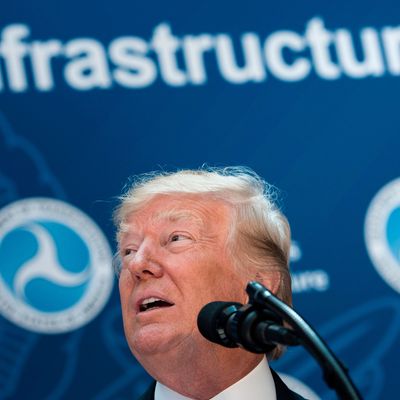
By month’s end, President Trump will (almost certainly) notch his first, major legislative achievement. There’s a good chance it will be his last.
With the Democrats leading the generic congressional ballot by double digits — and a bevy of other indicators pointing to a big blue wave — Republicans are, for the moment, on pace to lose unified control of the federal government by 2019. Meanwhile, the Democrats’ improbable triumph in Alabama has narrowed Mitch McConnell’s Senate majority to a single vote. The congressional GOP’s top legislative priority for 2018 is “welfare reform,” with Obamacare repeal (the fifth time’s the charm!) as a distant second. Both of these were long shots before Tuesday’s election – and are all but dead afterward. Susan Collins and Lisa Murkowski haven’t changed their minds about the health-care law. And if they don’t have the stomach to take medicine away from poor adults, they’re probably not gonna sign onto Paul Ryan’s plan to take food away from impoverished children. Once Doug Jones takes his seat in January, two Republican defections would be enough to kill any bill.
The only other legislative idea on the table is infrastructure. President Trump’s campaign promise to spend $1 trillion fixing the nation’s “crumbling roads and bridges” is popular with the public — but that counts for little on Capitol Hill (after failing to push through the most widely reviled health-care bill in recorded history, Republicans are on the cusp of passing the most unpopular tax legislation in four decades). Congressional conservatives have no interest in voting for new spending on any public investments (beyond those that can be used to kill people overseas). And they certainly aren’t going to support a revenue-neutral infrastructure plan that funds public improvements with new taxes — which means, Trump can’t pass an infrastructure plan through the budget-reconciliation process; which means, his bill will need support from Senate Democrats.
Given these realities, many expected the president’s infrastructure plan to remain a Godot-like specter, a bill that would forever keep Washington waiting. But now, Politico reports that the White House is nearly finished with its long-belated blueprint:
The plan set for release in January is expected to call for as much as $200 billion in federal spending over the next decade, with the rest coming from private investment, state or local funding and cuts to other federal programs. An administration official added new details this week, telling POLITICO that a wide variety of projects — from bridges to broadband — would have to compete for federal assistance, while showing they’re prepared to put their own money on the table.
The “primary” factor for cities and states wanting help from Washington would be how much revenue they are willing to raise, from taxes, fees or other sources, the official said.
… The administration has not made it clear exactly where it would find even $200 billion for the federal share of the package, beyond saying it would come from cuts from other places in the federal government.
Unfortunately for the president, the Senate is about as likely to pass this plan as it is to name a post office after Osama bin Laden.
Even if Trump copied the Democratic Party’s official infrastructure plan, verbatim, Chuck Schumer’s caucus would be reluctant to vote for it. The Donkey Party may be cruising toward a historic landslide in next year’s midterms. Democrats have every incentive to ensure that Trump’s only legislative accomplishment between now and then is the most widely despised tax cut in American history. From a purely political perspective, the last thing the Democratic leadership wants to do is help Trump pass a popular, bipartisan bill before November 2018.
But Trump isn’t even forcing Democrats to choose between their political interests and policy beliefs. If Politico’s reporting is correct, the president’s pitch to Schumer is, ostensibly: Help me pass a bill that rolls back environmental regulations, slashes $200 billion from social spending, and provides a little bit of seed money for state-level infrastructure projects — on the condition that states agree to fund the bulk of such projects through state and local taxes (which, by the way, affluent blue-state residents will no longer be allowed to fully deduct from their federal taxes).
If this is the president’s infrastructure plan, then he has no viable infrastructure plan; and his legislative legacy could very well begin — and end — at a signing ceremony next week.






























